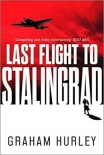Last Flight to Stalingrad by Graham Hurley (simple ebook reader .TXT) 📗

- Author: Graham Hurley
Book online «Last Flight to Stalingrad by Graham Hurley (simple ebook reader .TXT) 📗». Author Graham Hurley
The warning to both sides in this cut-throat war couldn’t have been clearer. The notion of retreat no longer applied anywhere on the front line. Every square inch of territory still in Soviet hands was to be defended at all costs. Deserters would be shot on sight. Mother Russia, in short, would prevail.
Messner left the campaign map with Richthofen and returned to his own office. In the early evening, he was summoned back. A long phone conversation with an officer on the spot at Maikop had confirmed Richthofen’s worst fears. Soviet troops had destroyed hundreds of wells, wrecked oil storage facilities and crippled the refineries around Maikop by removing key components. Most of the oil wells had been set ablaze and would burn for days. Concrete had been poured down other boreholes, setting solid within hours.
‘You want to know Goering’s solution?’ Richthofen glanced up. ‘He wants someone to come up with a gigantic corkscrew. What’s good for a bottle is good for an oil well. I’d love to say we’re working on it, but the engineers are in despair. Most of them want to lock Goering in that cellar of his. What the rest are saying is unprintable.’
Richthofen waved Messner into the chair in front of his desk. He rarely smoked in his office, but tonight was clearly an exception.
Messner enquired whether the Generaloberst wanted him to fly down to Maikop and file a report.
‘Not yet.’ Richthofen shook his head. ‘Maikop is a disaster but it might pay to look on the bright side. The Soviets down in the Caucasus are still falling back. In my judgement, whatever Stalin had to say, they’re finished. By the end of the month we could be on the Black Sea. The other oil wells are in Grozny, and the Ivans will wreck those, too, but if we ever get that far it’ll be time to stop. We’re at the end of the line here, as you know. Resupply is already a nightmare. In my view we only have one option, which might serve us very well. Tomorrow morning, I shall conference with Jeschonnek. The time has come to concentrate our forces, Messner, and I’m sure he’ll agree. That slowcoach Paulus has finally sprung a trap on the Ivans at Kalach. He should be over the Don and driving hard for Stalingrad within days. I want you to fly up there. By the time you arrive, God willing, we’ll have declared a new transport region. It will extend as far as Stalingrad and receive our full attention. The Ivans got a taste of the Schwerpunkt at Kalach. Stalingrad should be the real thing.’
He waved his hand in the direction of the map on the table, an unvoiced gesture that spoke volumes about command decisions at the very top of the Reich. Hitler and Goering, he seemed to be saying, should get their heads out of their arses and understand the brutal mathematics of a supply chain that reached back thousands of kilometres. Infantry needed food in their bellies. Guns needed ammunition. Tanks needed fuel. And the big Ju-52s, most important of all, needed luck and good weather, as well as full tanks, to bridge the gap between the end of the single railway line and the slow advance of Paulus’s Sixth Army.
‘How many tons a day, Messner? Take a guess.’ Richthofen was looking at a series of pencilled calculations on his desk.
Messner did a rapid calculation. Over a quarter of a million men. Hundreds of tanks. Thousands of guns.
‘Fifteen hundred tons,’ he said.
‘Double it.’
‘Three thousand?’ Messner shook his head. ‘Impossible.’
Richthofen looked up, a thin smile on his face.
‘My thoughts entirely,’ he growled. ‘You take off at first light. One way or another, we have to make this happen.’
*
Messner retired early, telling his orderly to rouse him before dawn. He enjoyed a dreamless sleep and was up and shaving by the time the orderly appeared at his door. He’d organised transport out to the airfield where he found himself looking at a spare Fieseler Storch that Richthofen had acquired from Kyiv. Messner’s usual Me-110, it turned out, consumed far too much fuel. As a portent of things to come, thought Messner, the message couldn’t have been clearer.
It was years since he’d last flown an aircraft this light and this responsive. He turned it into the wind and nursed it into the air after barely a hundred metres, glad to spare the fragile undercarriage any more punishment, and shaded his eyes against the orange spill of the rising sun as he climbed into a cloudless sky. To his right, the blueness of the Sea of Azov as it began to narrow. Beyond, the silver gleam of the River Don as it wound beyond Rostov towards Kalach.
Half an hour’s flying time from the landing strip, he banked to the west and lost height, uncertain about the weight of enemy air activity. The Russians were flying Lend Lease aircraft now, English Hurricanes, American Tomahawks, and even their own fighters – mass-produced by the hundreds in factories beyond the Urals – would feast on a little insect like the Fieseler Storch. With Kalach at last in sight, he stole a look towards the east. Stalingrad lay less than a hundred kilometres away across the interminable flatness of the steppe. With Sixth Army at full throttle, thought Messner, and the whole of Richthofen’s 4th Air Fleet at Paulus’s disposal, the city should fall within weeks.
He dropped a wing to find the airfield and, as he did so, a square packed with





Comments (0)